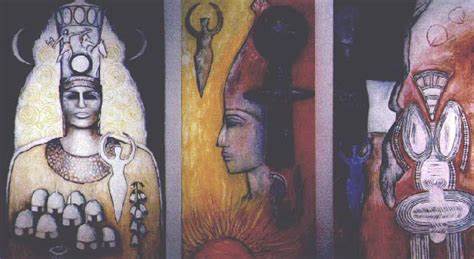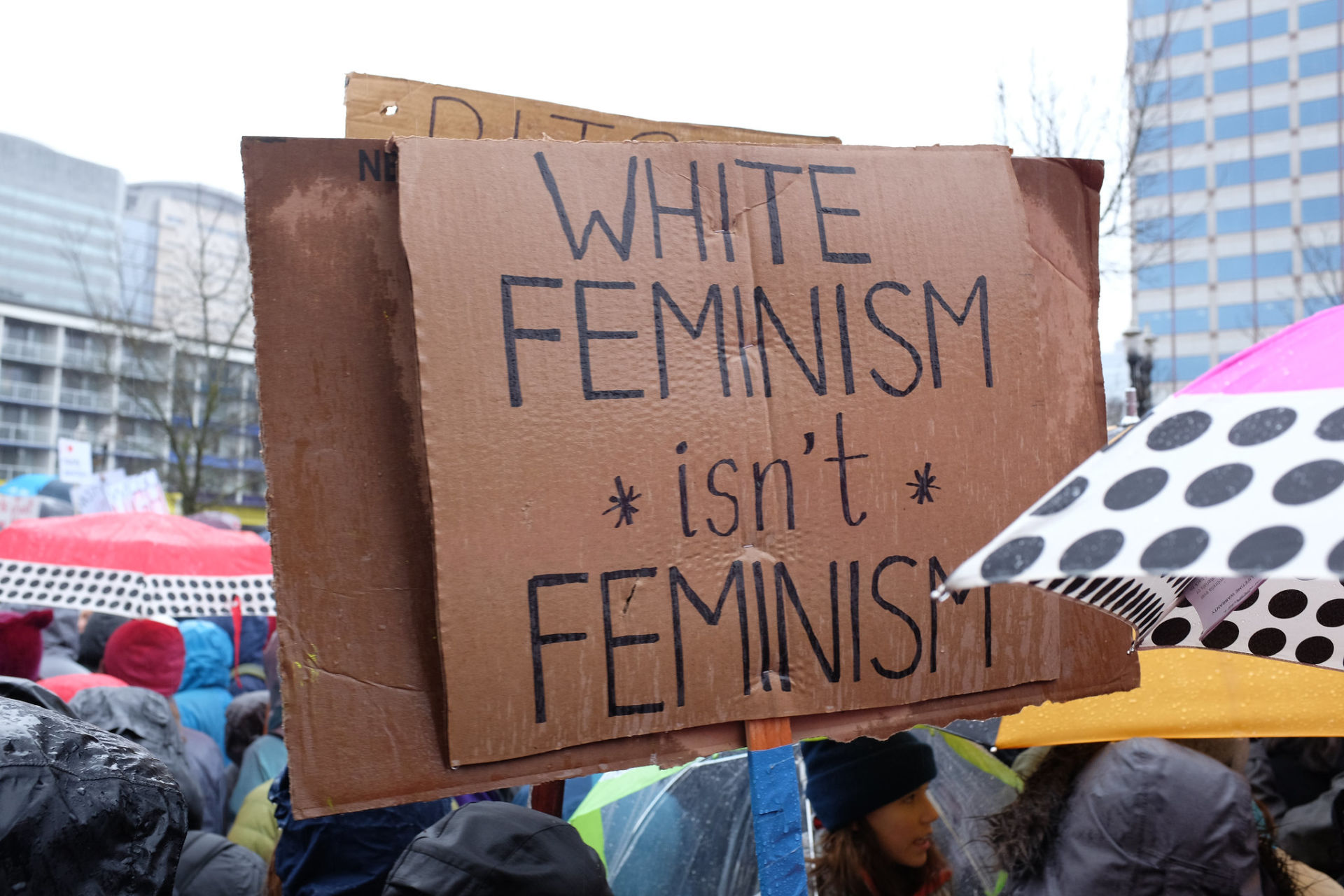Despite increased visibility around the politics of race and gender in contemporary times, antiracist scholarship and activism continue to face a difficult reception in white feminist spaces both in and outside the academy. My recent experiences of working with a small group of feminist academics, curators and art historians illustrate some of the ways feminists of colour repeatedly come up against white feminism’s insular stories about political struggle and the past.
In November last year, I took part in a webinar organised by the Monica Sjöö Curatorial Collective (MSCC) for the AHRC and British Academy 2020 Being Human Festival of the Humanities, designated with the theme of ‘New Worlds’. The MSCC webinar event, entitled ‘The Personal is Political is Spiritual: The Life and Politics of Monica Sjöö’, was designed to introduce the late artist and activist Monica Sjöö to a contemporary audience, and to showcase new research shedding light on the historical links between the Women’s Liberation Movement and women’s spirituality in the UK.

The opportunity to participate seemed too important to miss, as this theme was central to my PhD research. I approached it warily, however: I knew the event was likely to attract an audience of white spiritual feminists and Pagans with a personal interest in the topic.
My previous efforts to share insights drawn from antiracist feminist scholarship with this audience (as well as, unfortunately, some white feminists working within the academic study of religions and feminist theology) have garnered negative reactions.
This has led me to question over and over again whether engagements of this kind are really worth the personal cost, and whether I should perhaps set stronger personal boundaries in terms of what I will and won’t do either for the sake of activist commitments or for my (somewhat tarnished) pre-doctoral dream of a feminist academic career.
Occasions when I’ve had the chance to share my work with audiences of black and brown feminist colleagues and students, on the other hand, have mostly been welcoming and productive exchanges, albeit far too rare.
The contrast is revealing of the intersectional power relations of race and gender, and the way women of colour and black feminist scholars and activists are consistently marginalised in white feminist spaces. This marginalisation is structural and systemic—but that does not mean it is abstract or difficult to detect, especially for those repeatedly on the receiving end.
Marginalisation is actively enforced through consistent attempts to delegitimise our intellectual and political contributions, and through the gatekeeping of white spaces and fields of knowledge against the perceived threat of difference embodied by black and brown others. It’s an old story, attested by many writers through decades of black feminist, women of colour and decolonial activism and scholarship.
My experience of participating in the MSCC’s Being Human webinar, which took place over Zoom and attracted well over a hundred online attendees, drew a mixture of positive and negative responses.
There was a hairy moment when someone drew lines across my presentation slides while I was introducing the role of racial and cultural appropriation in Sjöö’s artwork — whether it was a coincidental mistake because of the Zoom setup, or a deliberate action, I couldn’t say for sure, although the timing was interesting.
When I’d finished my segment I was pleased to find positive feedback in the chatbox, and later my workplace inbox, from both white people — some of whom I knew from my Ph.D. fieldwork — and from women of colour in the audience.
In the days after the webinar, though, I quietly waited for the proverbial other shoe to drop, as I was fairly certain it would, based on prior experience. The predictable backlash did indeed occur, just over a fortnight after the event, in the form of an email from a fellow member of the MSCC, co-signed by the collective’s coordinator.
This message, addressed only to me — the sole woman of colour who had participated in the group — explained at length the hurt and distress of (white) feminists in response to my ‘questioning’ of Monica Sjöö’s work, evidenced by an angry email that a friend of the late artist had written to them after attending the Being Human event.
The webinar content had been carefully prepared by members of the MSCC in the preceding weeks. I had put in time and effort to make sure that I was presenting my work in a way that (I’d hoped) would be more palatable to an audience unfamiliar with conversations about racism and racialisation, but that would still maintain the integrity of my feminist of colour critique, and the academic background of the festival.
I’d rehearsed my segment with members of the MSCC twice. In spite of this, and in spite of prior assurances from the MSCC that an antiracist perspective would be a welcome contribution, two collective members now seemed to think that I needed to ‘see both sides’ of some sort of ‘equation’, and make myself personally answerable to the feelings and reactions of angry white feminists.
Their email reiterated several problematic tropes common to a white feminist worldview which crop up with wearying regularity, and which are likely to be recognisable by fellow scholars and activists of colour engaged in critiques of white feminism, racism and racialisation.
First of all, the authors framed antiracist and decolonial movements as the purview of a young and inexperienced generation who ought to be grateful for the ‘hard-fought-for and hard-won’ gains of an older generation of white feminists.
In a single, sweeping manoeuvre, they erased the richness of the political, cultural and intellectual movements of multiple generations of anticolonial, postcolonial, and antiracist activists and thinkers. In the desire to assert their own experiences as central to feminist progress, they affiliated themselves with the narrowest interpretation of feminism possible.
The histories, struggles, breadth and depth of black feminist, women of colour, and queer of colour critical scholarship and activism do not appear anywhere in this whitewashed historical narrative. I had emphasised women of colour and black feminist scholarship when talking about my research, but the email addressed to me demonstrated a total lack of awareness that it is these histories, rather than the history of white feminists like Sjöö and her contemporaries, that informs and makes possible the teaching and writing of feminists of colour in and outside the academy.
The all-too-familiar attempt to centre a white feminist generational narrative also sidelines those black and brown activists interested in race, gender and spirituality who may have already engaged with the MSCC’s Being Human webinar, and who might have been interested in the collective’s future curatorial work.
Secondly, the email engaged in an egregious form of whitesplaining. The authors carefully explained to me that it is hurtful for white feminists to hear antiracist critique because they hear it as an attack. This statement directly repeated to me my own analysis of white Goddess feminism set out in the article ‘Arachne’s Voice: Race, Gender, and the Goddess’, without actually acknowledging or citing it.
I had checked whether members of the MSCC had read my work in the last meeting as I was concerned by what sounded to me like confused attempts to brush aside the importance of race in their intended future curation of Sjöö’s art and to label my research as being about ‘diversity’ (rather than antiracist feminism).
Aside from a few nods and the coordinator’s assertion that yes, she’d read it, there was an awkward silence, palpable even through the digital vortex of Zoom. It was a red flag that some kind of conflict or reactionary response was not far behind.
Drawing on Kristie Dotson’s analysis of how dominant groups respond to the language of oppressed groups as though it were unhearable, especially the speech of black women, ‘Arachne’s Voice’ re-deploys metaphors of spiders and weaving —popular in the women’s spirituality movement and in 1970s-80s feminist writing— to show how white spiritual feminists engage in the silencing and marginalisation of women of colour and black feminists. The two MSCC members who wrote to me performed exactly the process I had described, apparently without being aware of what they were doing.
Thirdly, they assumed that rather than the bigger problem of racial inequality among women, I, and the MSCC in general, ought to prioritise appeasing the hostile and/or hurt reactions of white feminists who feel threatened by the existence of black and women of colour feminism. The MSCC members who authored and addressed the email to me tried to lay personal responsibility for this at my door.
Although they were ostensibly writing on behalf of the feelings of another white feminist, their own discomfort was noticeable. In my first meetings with the MSCC in September, I was aware that my research introduced a discordant note into what had previously been intended as a distinctly non-diverse, celebrational curation of Monica Sjöö’s legacy—rather problematic, given how much there is to unpack and scrutinise in her art and activism. ‘We’re so glad you’re bringing that other perspective,’ the collective’s coordinator had said awkwardly, at the end of my first meeting —again, with no hint of irony or self-awareness.
Not long after the email, I received a similar message on social media from another of Monica Sjöö’s white feminist contemporaries, who also felt the need to tell me about their sadness and disappointment at my webinar contribution. They followed this with a request for my personal help to improve their ‘feminist praxis’, presented as if it were some sort of mutual compensation —almost needless to say, I did not oblige.
The weaponisation of white women’s hurt feelings in response to the entirely reasonable, often measured and self-censored speech of black and brown people who challenge the structures of racism is a white feminist tactic that many women of colour have had to endure repeatedly. To quote Toni Morrison, ‘the function, the very serious function of racism…is distraction. It keeps you from doing your work. It keeps you explaining, over and over again, your reason for being’. It’s a trap I’ve fallen into more than once—distracted, or prematurely warned away from doing the kind of creative and political writing I had always hoped to do.
There was more in the original email that was problematic: they tried to insist that Monica Sjöö was ‘aware of intersectional issues’. She was not, except in the most cursory, abstract sense. Such a claim is a misappropriation of Kimberlé Crenshaw’s theory, and an erasure of the black feminist history that laid the groundwork for making visible the intersectional racialised and gendered lived experiences of black women in legal and institutional frameworks.
That Sjöö and other white spiritual feminists failed to recognise these embodied experiences ought to have been obvious from my webinar segment where I discussed examples of the objectification and romanticisation of women of colour in Sjöö’s art and writing, linking it to the overall white feminist history of the Goddess movement.
‘Let’s stay aware of complexity’, they wrote, as if my own work, and women of colour theorising more broadly, is a bit too basic when it points out that racialisation happens in embodied ways and that racism does, in fact, exist, including in feminist spaces.
https://twitter.com/jkpuar/status/1335068611858354176?s=20
Feminists of colour even wrote about these processes over many years in great depth and detail. I can almost hear another standard tactical weapon of white knowledge practices—‘too polemical’—following not far behind, working to banish the wealth of black and brown feminist scholarship to some unhearable corner of the academy.
The email went on to pre-emptively try to reason with an imaginary polemical response by referring to the authors’ fears of a ‘Brexit and Trump’-style ‘polarization of debate’, apparently without realising the right-wing connotations of this comment.
They finished by signing off ‘in sisterhood’—a concept which has been thoroughly critiqued by black feminist scholar Hazel Carby because of its usage within white feminism, where its surface-level idealism has worked to erase the experiences of people oppressed by both race and gender.
For this reason, white feminist claims to sisterhood and/or maternality, especially in relation to marginalised women, are often used to obscure inequalities and abuses of power. This is something I have experienced first-hand more than once, and as a result, I do not identify with white feminist declarations of sisterhood.
Related Articles: Privilege, Power, and Pride: Intersectionality within the LGBT Community | Kamala: The Intersection of Race and Gender for Black Women in U.S. Politics
In my reply, copied to the whole collective, I pointed out that discussions about the historical construction of race are framed as two-sided public ‘debates’ chiefly by right-wing white supremacists and racism deniers. I explained in detail why the email addressed to me was so deeply problematic (much as I have done here), and recognising the need for an immediate boundary, I stated my withdrawal from further collaboration with the MSCC.
A flurry of emails shortly ensued from several other members of the group—messages of solidarity and/or disappointment that the offensive email had been sent to me in the first place. As one member pointed out, their reaction against my work was a (self-)destructive move, given that the MSCC, myself included, had collectively considered the production of the webinar to be an overall success in its immediate aftermath.
The email’s authors then backtracked, suggested it was all a misunderstanding, attempted some justification, and eventually apologised. One of them belatedly cited my article ‘Arachne’s Voice’ in an effort to show they had read some of what I have written about Monica Sjöö and white women’s spirituality (also demonstrating an understanding that watered-down, liberal notions of ‘diversity’ are far from the point). Quoting a central theme from my article, they claimed their real intent had been to ‘open a reciprocal dialogue’.
Reciprocal dialogue in this situation, I explained, would be dialogue that does not immediately and pre-emptively construct feminists of colour as dangerous others who threaten the comforting historical fantasies of white feminism. What they had actually done was put in place and re-enact, like clockwork, the conditions of adversarial dialogue that reinforce white women’s social power, and at the same time marginalise black and brown antiracist feminist thought and activism.
From the email exchanges, it soon became evident that several members of the MSCC would have liked to pursue a critical, rather than purely celebratory, curation of Monica Sjöö’s art and activism, including an exploration of the problems with her race and gender politics.
Oddly, this had never come up before the email targeted at me, and my ensuing withdrawal from the project, even though the collective had been meeting for approximately a year before I joined them in September 2020.
As related in another reply I sent to the MSCC, these conversations ought to have happened before I joined the group, in order for me to participate in what might have been a productive and far more interesting conversation about what critical curation could mean in the case of Monica Sjöö. Instead, what has taken place is yet another iteration of white feminists’ adversarial relational dynamics with feminists of colour.
However innocently, the collective oversight effectively placed me in the position, as Sara Ahmed eloquently puts it, of the person who ‘becomes a problem because [they] notice a problem’ and dares to draw attention to it. It was also evident that the views of the group’s coordinator may have been part of the reason for the lack of open communication.
Although she too eventually apologised ‘unreservedly’, at first she wrote that she found the whole issue to be ‘thorny’, and misguidedly wondered if she ought to have forwarded the original angry white feminist email straight to me in the first place. In short, no, this would perhaps have been worse.
Having survived similar scenarios during my doctoral years, sticky situations like this are not new to me, and (in case it needs to be said) I do not enjoy the accompanying stress they bring. As many feminist of colour scholars know, these are institutional occurrences rather than singular, isolated events.
They can become exhausting as similar, repetitive experiences chip away at individual and collective resources needed to transform social and political injustices. Nevertheless, it is also a form of activism for feminists of colour to document these events where possible, leaving traces—or what Sara Ahmed and Heidi Mirza have called ‘lifelines’—for other scholar-activists to pick up in order to strengthen their own battles.
Here are a couple of take-away lessons from my experience that might be helpful. If racialised scholars or activists suspect that a particular project or collaboration is likely to backfire or cause us harm at some point, we need to take care not to minimise our instincts, experience and expertise just to fit in and conform to dominant, white expectations of collegiality.
Given the disintegrated state of the academic job market and its precarious working conditions even prior to the pandemic, it is important to qualify this by acknowledging how difficult it can be in practice for early career researchers to resist the expectation to conform.
I have wondered, in hindsight, if I should have stated outright that the MSCC’s approach to curating Sjöö’s life and work, introduced to me as a desire to ‘reclaim’ her as an ‘exemplary feminist’, sounded incompatible with my research. Instead, I ended up trying one more time to introduce a feminist of colour approach to what looked from the outset like an exclusively white feminist project.
And if white colleagues invite me to participate in public events again, online or offline, I know by now to check carefully that they understand the risks marginalised speakers face when speaking to an audience where we are not well-represented.
A project coordinator or event chair must also be able to respond appropriately to negative reactions from stakeholders and audience members, and in general, be able to facilitate constructive communication, and not make black and brown speakers responsible for the conditions of their own marginalisation.
One of the red flags for me in this experience was that the coordinator and event chair seemed to completely overlook the significance of ensuring the webinar event was a safe space both for me and for black, brown and queer members of our potential audience.
Along with another member of the MSCC, I had to emphasise the need to include, at the very least, a statement of event etiquette at the beginning of the recorded webinar. Many scholars would recognise this as standard for public event chairing, teaching and group facilitation of any kind.
A lack of awareness around this in the run-up to the webinar caused me a great deal of worry before the event itself—as it turned out, with good reason: some of my colleagues in the MSCC had assumed angry white feminists to be in need of safeguarding from marginalised black and brown scholars, rather than the other way around.
The 2020 Being Human Festival was themed around ‘New Worlds’, clearly intended to be interpreted as future-oriented and politically progressive: the launch event was an inspiring, reciprocal dialogue between Professor David Olusoga and the festival director, Professor Sarah Churchwell, on the topic of decolonisation. The latter held another reciprocal and friendly conversation on the recent US election with the author Bonnie Greer a few days later.
The problematic reactions from some members of the collective who organised the webinar event I participated in, and from some in the online audience, are another reminder that progress does not follow a straight line from oppressive history to liberated future.
The dream of new worlds can all too easily remain wrapped in the patterns of an old and familiar social fabric, like the relational dynamics of racial marginalisation, if they are not carefully unpicked and dismantled in the present. Similarly to my conclusion in ‘Arachne’s Voice’, the point here is that the exploration of new worlds and concepts must remain critical in order to avoid reproducing the historical mechanisms of oppression. To cite the indispensable Sara Ahmed again: feminism ‘is a project because we are not there yet’.
Editor’s Note: The opinions expressed here by Impakter.com columnists are their own, not those of Impakter.com. — In the Featured Photo: Women’s March in the US – White feminism isn’t feminism. Featured Photo Credit: John Floyd











